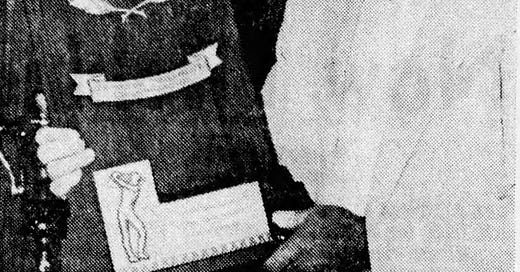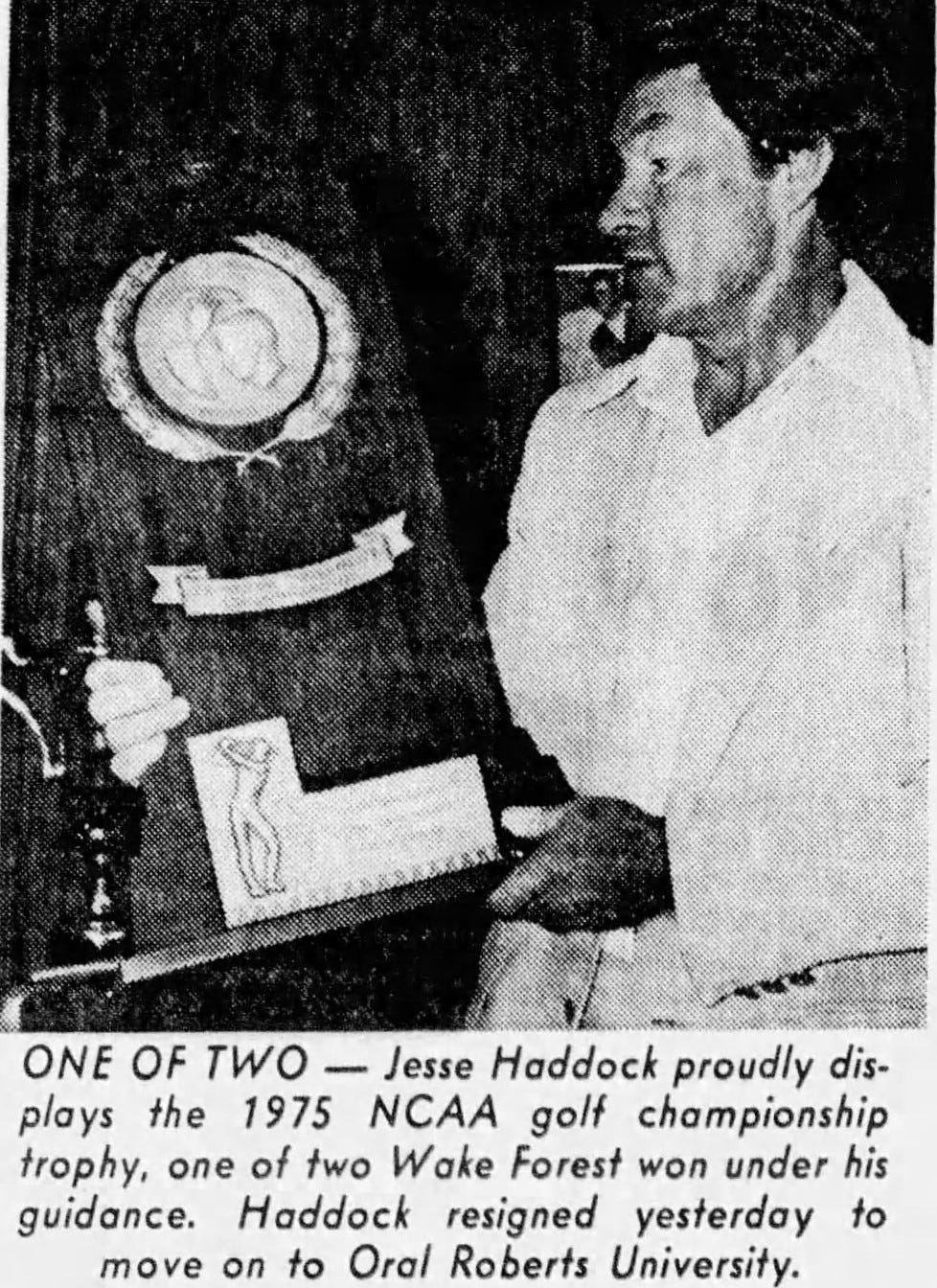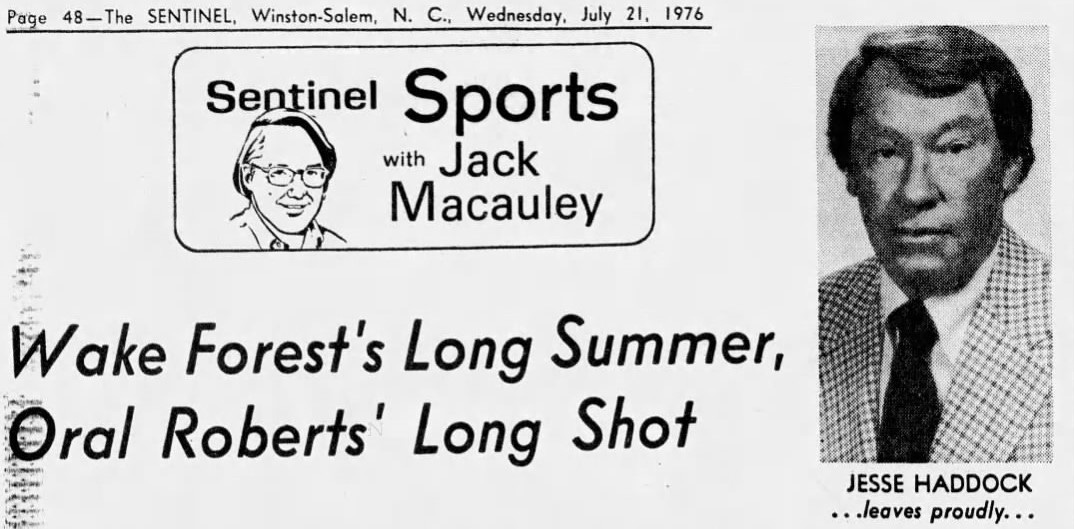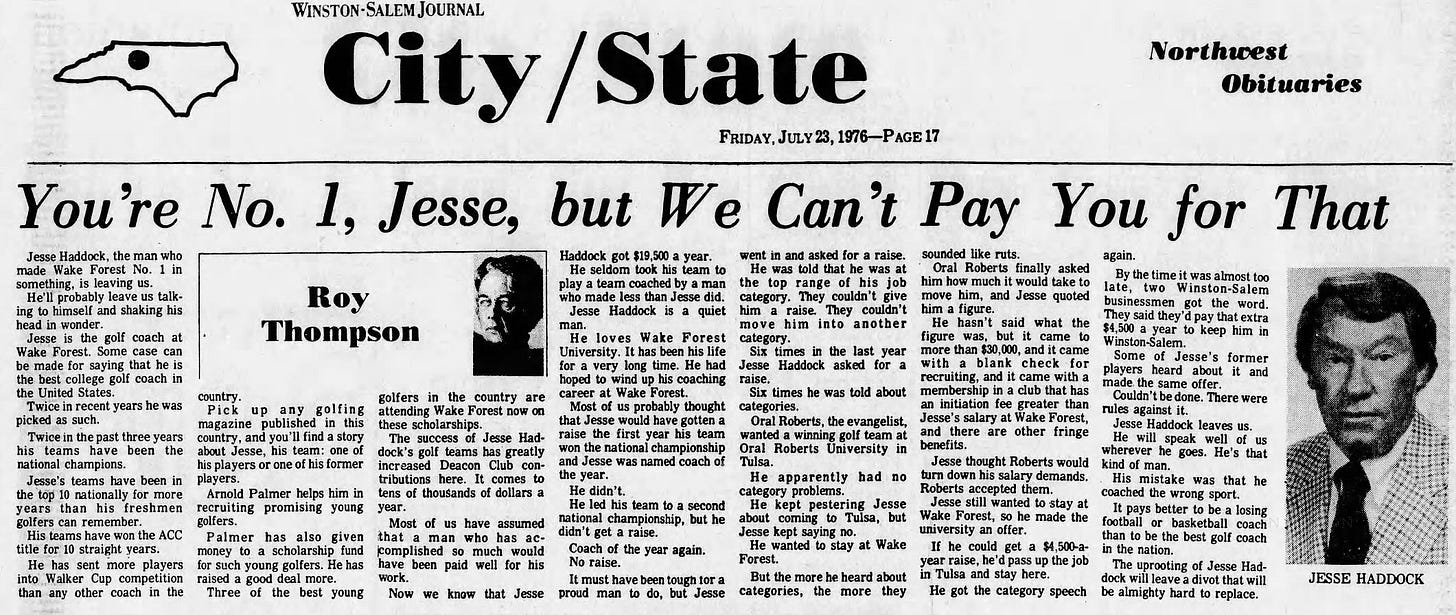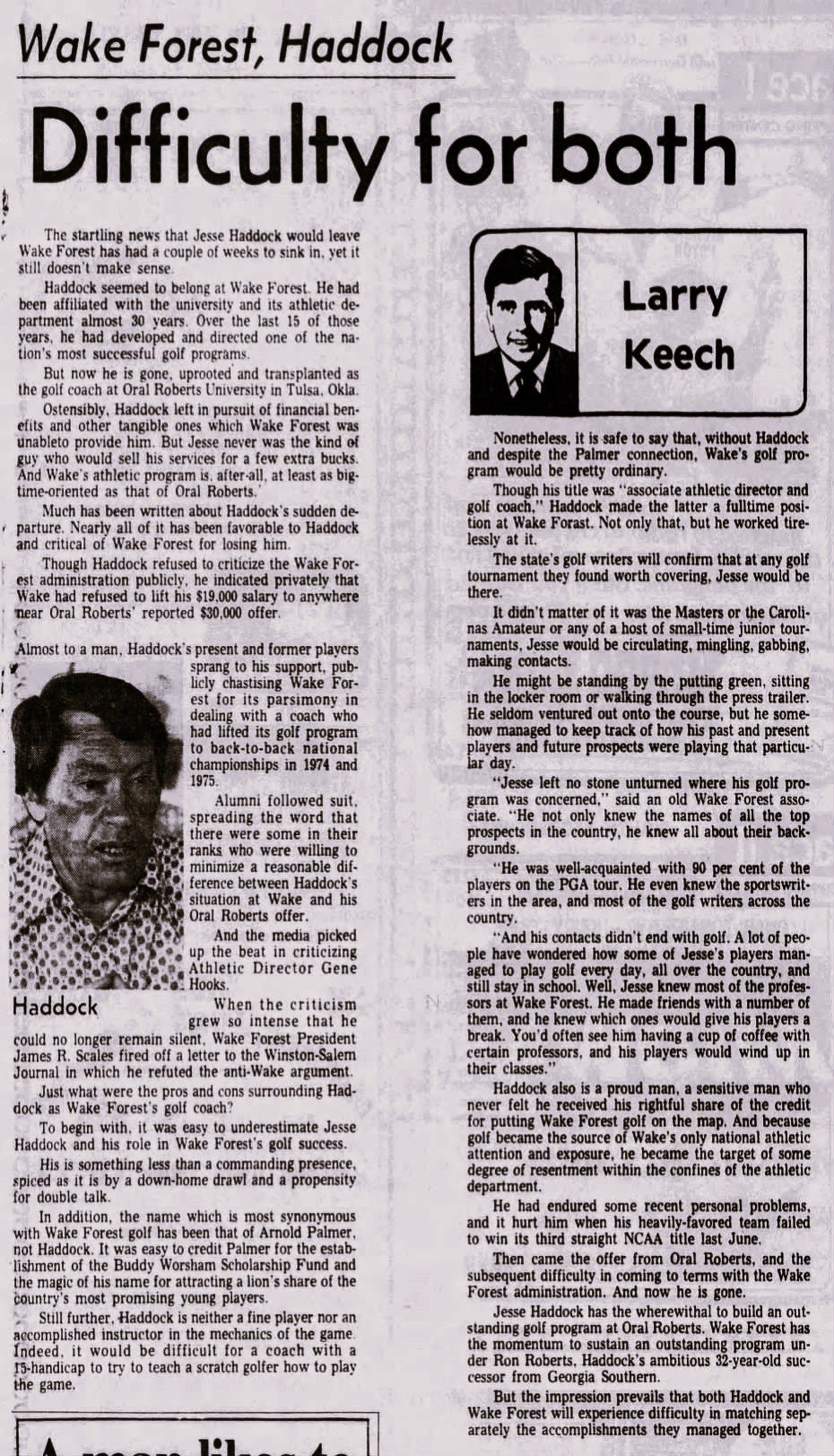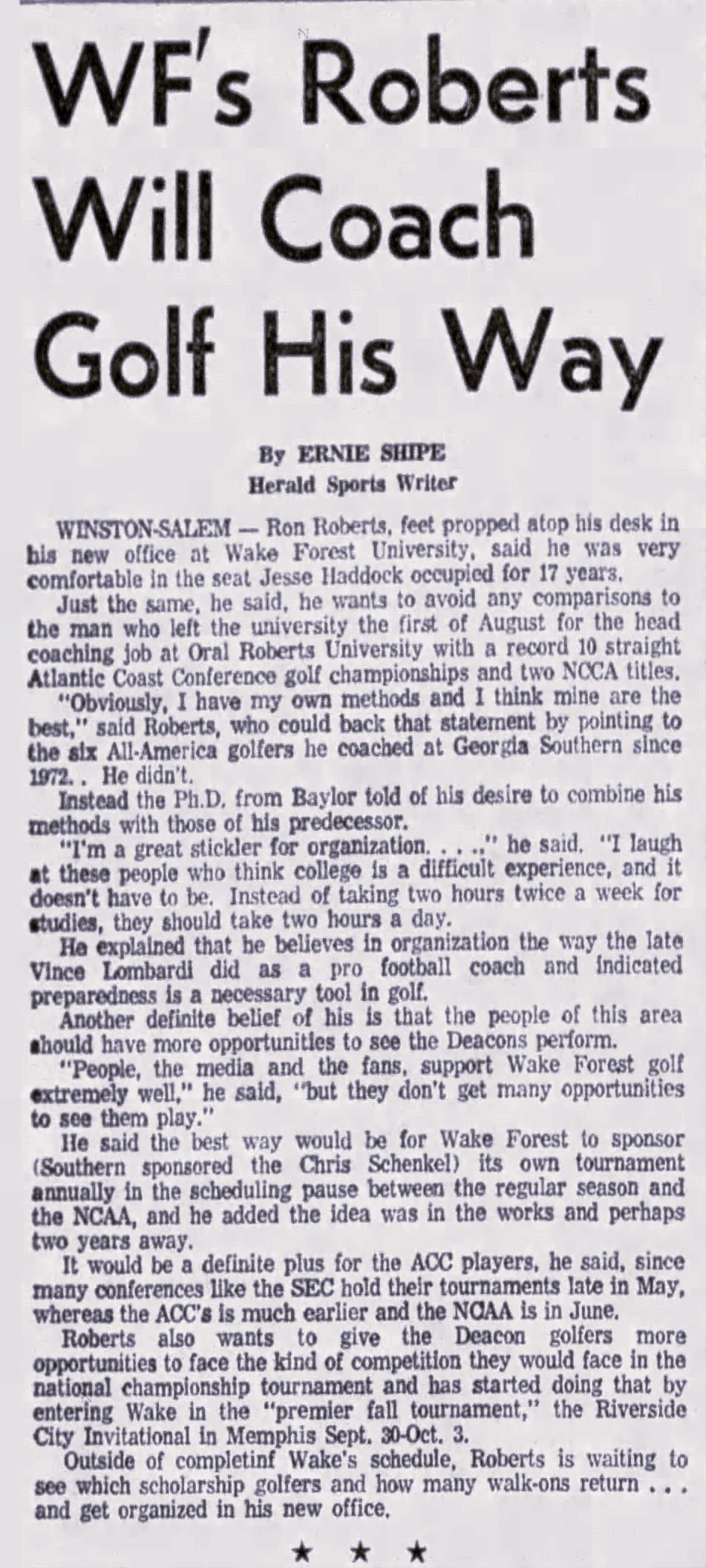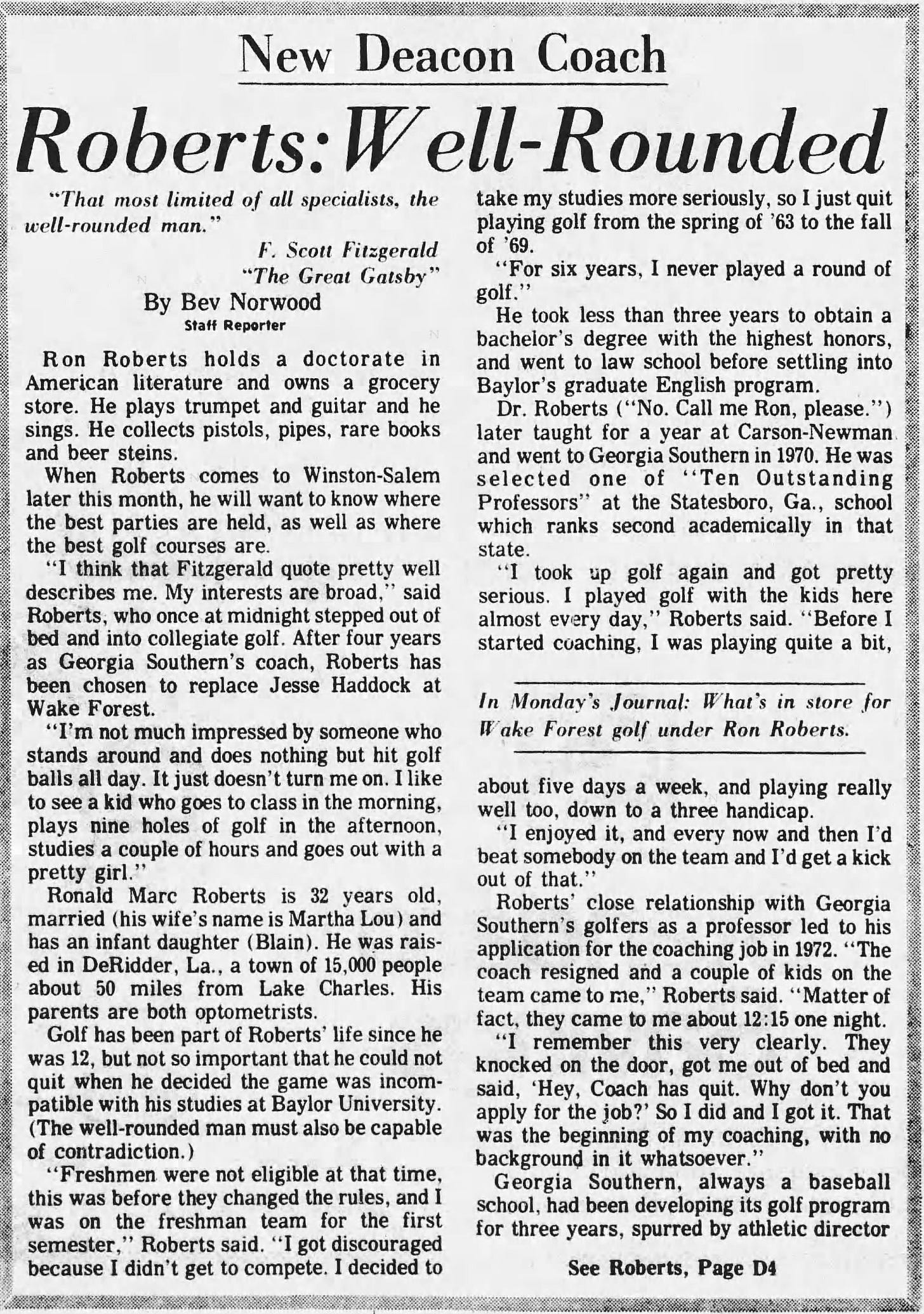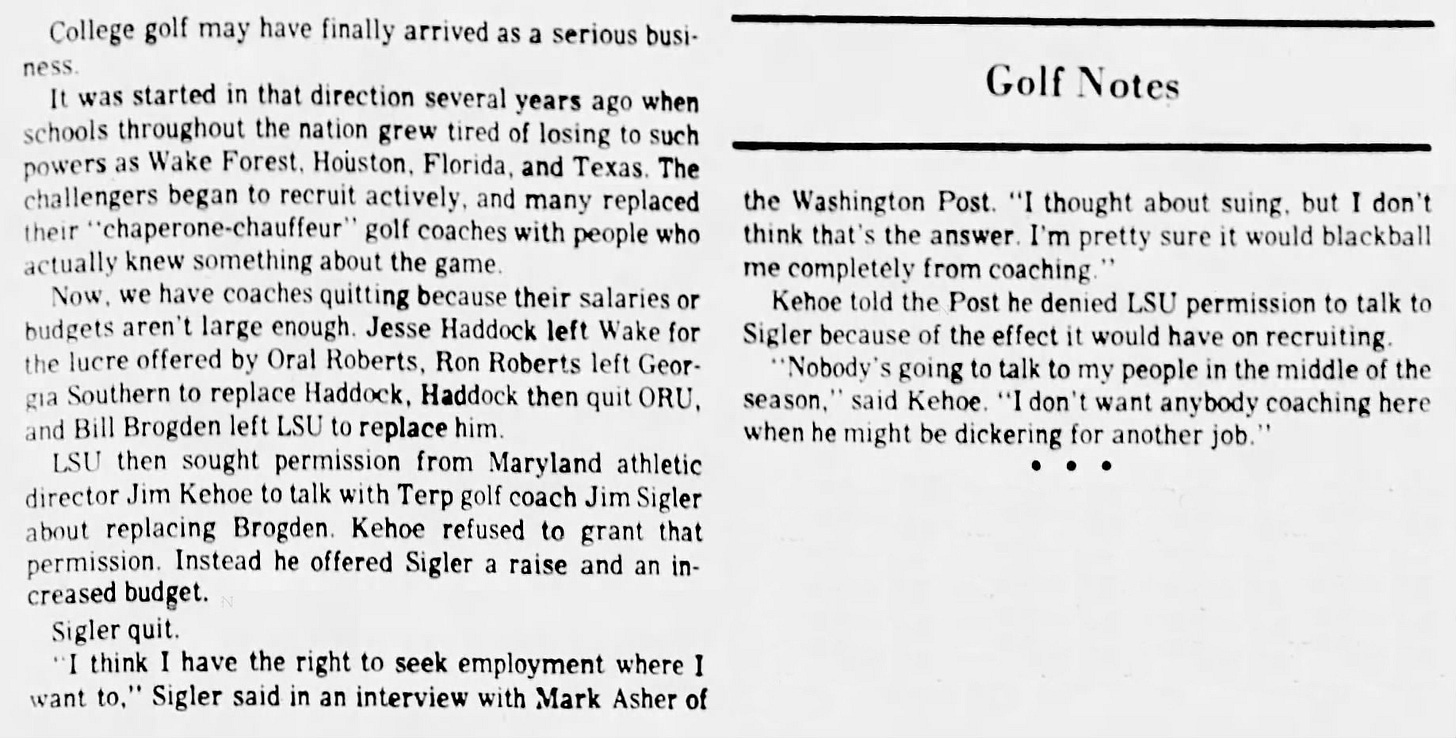Coaching Carousel: 1976-1977 (Part 1)
The Ripple Effects of Coach Haddock's 18 Months Away From Wake Forest
THE RIPPLE EFFECTS OF COACH HADDOCK’S 18 MONTHS AWAY FROM WAKE FOREST [1976-77]
Any time there is a coaching change it inevitably leads to cascading changes throughout the college golf world. Sometimes the number of schools affected is fairly small, but there are some instances where a single coaching change shakes up the course of history.
Some folks with either long memories or a curiosity for college golf history may know that Jesse Haddock briefly left Wake Forest after the 1976 NCAA championship only to return in the middle of the 1977-78 season. It was a relatively short blip over the course of his career, but those 18 months had a significant ripple effect that led to several interesting events across 5 different teams, affecting the career of two other Hall of Fame coaches, and heated discussions regarding career moves that resulted in one lawsuit and the threat of a second.
PART 1: THE CAROUSEL
COACHING CHANGES
There are many people and team changes mentioned in this post, so here’s a quick outline to hopefully provide better context:
*NOTE: underlined text provides a link to references or sites with more information
1976 (summer):
Lost Coach Jesse Haddock
Hired Coach Ron Roberts
1977 (December):
Fired Coach Roberts
Hired Coach Haddock
1976 (summer):
Lost Coach Jack Higgins
Hired Coach Haddock
1976 (December):
Lost Coach Haddock
Hired Coach Bill Brogden
1976 (summer):
Lost Coach Roberts
Hired recent grad Buddy Alexander as “Interim Coach”
1976 (December-February 1977):
Lost Coach Brogden
Hired Coach Dave Sigler
1982-83:
Lost Coach Sigler
Hired Coach Buddy Alexander
1976 (December):
Hired former Assistant Coach (and player) Randy Hoffman
BACKSTORY
Coach Jesse Haddock and Wake Forest Golf
Jesse Haddock was once a classmate (and even roommate) of Arnold Palmer’s at Wake Forest, but he wasn’t a golfer. In fact, the man that by the mid-1970s had become one of the most revered college golf coaches had not bought his first clubs until age 30. Despite his lack of playing prowess, Coach Haddock was said to be passionate (in his own way) and he learned what it meant to be a teacher and a coach.
Haddock took over coaching duties at Wake Forest in 1960. One column in the Winston-Salem Journal said “he was entrusted with keeping the car in gear and finding the course, little more.”1. Coach leveraged his association with Palmer to get $500 to go towards a golf scholarship in Palmer’s (and Bud Worsham’s) name to attract recruits. From there he slowly built a powerhouse that by 1976 had accumulated 23 All-Americans, back-to-back NCAA team titles led both times by the individual champ, and was the ten-time reigning ACC team champion.
Unsettled Feelings and a Tempting Offer
Following the graduation of one of those individual champs and the loss of the other to the pro tour, Wake Forest was on the verge of turning over its roster with fresh All-Americans eager to recapture those championship trophies after the disappointing 4th place finish at the 1976 NCAA championships in New Mexico. Even with all of this success and new motivation, something wasn’t quite right at Wake Forest. One news report from the time indicated that Coach Haddock was unsettled and looking for a new challenge.
The thought of Haddock coaching anywhere other than Wake Forest was practically unthinkable, and yet not long after returning home from the NCAAs there were whispers that the evangelist Oral Roberts was looking to make a big splash in hiring a nationally recognized coach to jumpstart the golf program at his namesake university. Oral had made an incredibly tempting pitch that included a substantial salary increase and the challenge of building a new (well 10 years old but essentially new) program any way Coach Haddock saw fit. The offer proved to be one Haddock couldn’t turn down and more than Wake Forest could match. By mid-July the news broke that Haddock was on the move, sending shockwaves across the college golf landscape.
“It’s not just his recruiting - although that’s been phenomenal - it’s what he does for the whole university. His program brings in more contributors than any other, and he’s synonymous with the [Wake Forest golf] program in many parts of the country. People talk about Arnold Palmer making the program for Jesse. Listen, Palmer doesn’t deserve three-quarters of the credit he gets out there - Jesse’s such a big man, he just lets people assume that. I think Jesse was a little unhappy because after two national titles and all those All-Americans, he didn’t get the rewards he thought he should. Without some bad beaks, he could have had four of five NCAA championships.”
Lanny Wadkins (July 1976)
What Almost Happened
Before we jump into what actually happened, let’s take a minute to examine what nearly went down. A few days before the news broke of Coach Haddock taking the Oral Roberts job, it was almost announced the next coach would be Oklahoma State’s young Coach Mike Holder. It’s weird to say something was “almost announced” but apparently it was that close to happening. Instead of leaving, however, Coach Holder signed a new contract with his alma mater, where he would enjoy incredible success and become one of the most accomplished coaches in college golf history. Supposedly, Holder and Haddock were the only two candidates interviewed for the position at Oral Roberts.
How did those next 3 years play out? Oklahoma State finished runner-up in the 1977 NCAA championship (Houston), won the title in 1978, and runner-up again in 1979 (Ohio State).
CAROUSEL COMMENCES: COACH HADDOCK LEAVES WAKE FOREST [SUMMER 1976]
Oral Roberts Hires Coach Haddock [Wake Forest]
As mentioned above, Coach Haddock was recruited to Oral Roberts University by the man himself who offered a significant salary increase that Wake Forest couldn't match - reportedly jumping up from $19k to over $30k annually. Dr. Gene Hooks, Wake Forest Athletic Director, stated from the get-go that he believed the move was a financially-driven one for his former golf coach (and refuted some of the reported figures), however other articles emphasized the new challenge and freedom Haddock would enjoy in filling all five NCAA-allotted scholarships and a substantial budget to boot. In any case, Coach Haddock’s move from Winston-Salem, NC to Tulsa, OK set the coaching carousel in the motion.
“I was the only man invited in that did not apply, and I can’t say what they said to me because it would be ego. They said they wanted the best and it made me feel good. They figure a golf program can help promote the school (which is only 11 years old), and they wanted the best program possible. The in-depth thing was their enthusiasm. I was most impressed with the way they put it to me about how the golf program would be supported, and they put no pressure on me to win.”
-Jesse Haddock quotes from The Charlotte Observer (July 14, 1976)
Wake Forest Hires Ron Roberts [Georgia Southern]
After a fairly brief one-month search, Wake Forest hired Ron Roberts away from Georgia Southern before the start of the 1976-77 season. In many ways, Coach Roberts was the opposite of his predecessor at Wake Forest. For one, Roberts held a Ph.D. in English from Baylor University and was an assistant professor in the subject while at Georgia Southern. Also, Dr. Roberts was reportedly an excellent golfer with a single-digit handicap. Coach Roberts, who had run the Georgia Southern golf program and was the director of public relations for the last 4 seasons, had amassed his own impressive list of six All-Americans and even boasted two of the only four matches lost by Wake Forest in the last couple of years - 1974 Palmetto Invitational and 1975 Pinehurst Invitational. Ron Roberts might not have been the obvious choice to replaced Haddock at Wake Forest, but he was an excellent one. His attitude that it was the best college golf job in the country as well as the declaration that he would run it his own way outside of Haddock’s shadow clearly resonated with Wake Forest officials.
Georgia Southern Hires Buddy Alexander
Georgia Southern filled their coaching vacancy with recent grad (and team captain the past 2 years) Buddy Alexander who had returned to school to get Masters degree while playing high-level amateur events such as the US Amateur. The son of legendary pro (and former Duke star) Skip Alexander, Buddy was born a player, but it turns out he had the makings of a great coaching career as well.
Haddock Leaves Oral Roberts After 1 Semester
Coach Haddock did not stay at Oral Roberts very long, lasting only the Fall semester of 1976-77 season. Apparently, Coach Haddock was recruited to join the sports management company World Management and Marketing, Inc. shortly after taking the coaching job at Oral Roberts. As stated in the article below, Haddock planned to stay at ORU at least a full season before bolting for the business world, but decided he couldn’t in good conscious go through the important recruiting season only to leave. As a part of his resignation, which seems to have been received without ill will by Oral Roberts, Haddock recommended LSU coach Bill Brogden for the position. And so the carousel kept on spinning.
Oral Roberts Hires Coach Brogden [LSU]
Bill Brogden was in the enviable position of leading the LSU golf program that was regularly competing on the national level. Unfortunately, that position also came with the added burden of a teaching schedule that wouldn't allow him to coach full time. Dissatisfied with the untenable situation, Haddock’s recommendation for Coach Brogden to replace him at Oral Roberts was an incredible stroke of good fortune for both him and the school.
One other thing Haddock did to help set Coach Brogden up for success was bringing with him a player from Wake Forest who ended up staying even after he left Oral Roberts. Mark Tinder was one of the top recruits in 1974 when Wake Forest landed him, and although he hadn’t enjoyed the individual success he had hoped, he was unquestionably a great player and teammate. When Haddock left Wake Forest, Tinder requested a transfer to Oral Roberts to follow his coach. Surprisingly, after some public petitioning by both Coach Haddock and Mark’s father, Wake Forest acquiesced. This is another one of those ripple effects from Haddock’s movements as Tinder’s actions at Oral Roberts would help gather a series of recruits that quickly built up an insanely good team; one that in a few years time would finish 3rd in 1980 NCAAs and 2nd in 1981 after being one of the top teams all year.
For more information on the incredible Oral Roberts saga, check out Baylor Coach Mike McGraw’s podcast Better Than I Found It episodes with Coach Brogden and former player Jim Kane.
LSU Hires Coach Dave Sigler [Maryland]
Sometimes the ancillary details are the ones that find an interesting way to tie into the main story. LSU’s hiring of Maryland Coach Dave Sigler - who ended up coaching LSU from 1977-82 - may seem unimportant to the story of Jesse Haddock/Wake Forest/Oral Roberts, but there’s an interesting foreshadowing to events at the end of the year. Coach Sigler not only resigned from Maryland over the LSU job when the Maryland AD refused to let LSU talk to Sigler in the middle of the season, he came very close to filing a lawsuit over the matter.
From the Feb, 1977 Washington Post article Sigler Criticizes Kehoe For Blocking LSU Contract by Mark Asher:
Former University of Maryland golf coach Dave Sigler said he quit his job recently because athletic director Jim Kehoe refused to allow him to dicuss [sic] the vacant golf coaching job with officials at Louisiana State.
Sigler, 39, said he pondered suing Kehoe, but decided against such action because he thought it might blackball him from coaching.
On Dec. 28, Sigler inquired about the LSU vacancy. LSU in turn asked Kehoe if it could talk to Sigler. Kehoe refused. The next day he gave Sigler a pay raise and increased his budget.
All the time, Sigler was not aware of Kehoe's conversation with LSU athletic director Carl Maddox. Two days later Sigler returned to Kehoe, disturbed that LSU has been denied permission to talk to him about a better-paying job with double the budget he had at Maryland.
Kehoe gave Sigler two choices: accept the pay raise and budget increase or quit.
Sigler said, "I resign."
Kehoe said, "Put it in writing."
Sigler did.
Kehoe said, "I accept it."
"I think Kehoe was wrong," said Sigler, whose team finished minth [sic] in last year's NCAA championships. "I think I have the right to seek employment where I want to. But I don't think suing is the answer. I'm pretty sure it would blackball me completely from coaching. I want to continue coaching."
Kehow [sic] said he denied LSU permission to talk to Sigler in midseason because of the effect it would have on recruiting, Sigler, in an interview, said that all of his financial aid already had been committed for the 1977-78 school year.
"Nobody's going to talk to my people in the middle of the season," said Kehoe. "I don't want anybody coaching here when he might be dickering for another job . . . If he has a real good boy (recruit), he'll probably take him with him. If a guy wants to do something else, be somewhere else, that's where I want him to be. I want people here who are all for Maryland."
Sigler, a Maryland graduate, is also an instructor in physical education at Maryland. The athletic department pays $2,800 of his toal [sic] salary of approximately $18,000. Marvin Eyler, dean of Maryland's physical education department, gave Sigler permission to talk to LSU officials.
Sigler, who coached at Maryland eight years, four as head coach, and helped developed PGA tour regular George Burns, among others, is one of six finalists for the coaching job at LSU. The LSU vacancy is expected to be filled later this week.
In a fun twist of fate, the coach that eventually replaced Sigler at LSU was none other than Buddy Alexander, who had coached at Georgia Southern from 1977-80, then took a couple years off to focus on his own golf game. The same year that he won his first SEC championship (1986), Coach Alexander also won the US Amateur and represented the United States at the World Amateur Team Championship for the Eisenhower Trophy. The next year his LSU team would repeat as SEC champs and he would represent the winning US Walker Cup team.
NEXT UP: PART 2 HADDOCK’S RETURN TO WAKE FOREST
Thanks for reading!
Winston-Salem Journal. July 13, 1976. Mark Whicker Haddock’s Incentives

